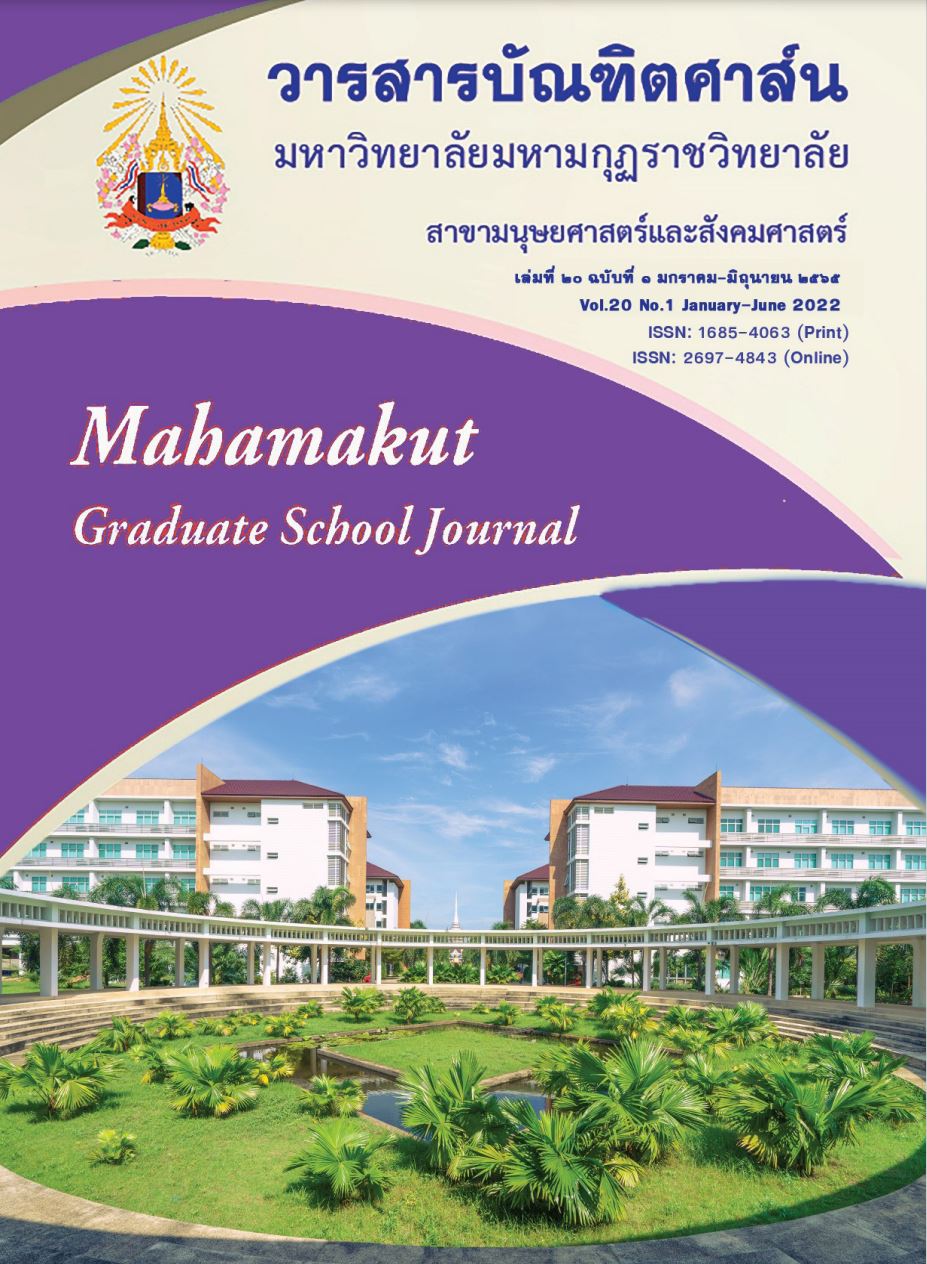ภาวะผู้นำแบบมีส่วนร่วมเชิงบูรณาการอธิษฐานธรรมของผู้บริหารสถานศึกษาที่ส่งผลต่อการบริหารงานวิชาการในสถานศึกษา สังกัดสำนักงานเขตพื้นที่การศึกษาประถมศึกษาสมุทรสาคร
คำสำคัญ:
ภาวะผู้นำแบบมีส่วนร่วมเชิงบูรณาการอธิษฐานธรรม, การบริหารงานวิชาการบทคัดย่อ
การวิจัยนี้มีวัตถุประสงค์เพื่อ 1) ศึกษาภาวะผู้นำแบบมีส่วนร่วมเชิงบูรณาการอธิษฐานธรรมของผู้บริหารสถานศึกษา สังกัดสำนักงานเขตพื้นที่การศึกษาประถมศึกษาสมุทรสาคร 2) ศึกษาการบริหารงานวิชาการในสถานศึกษาสังกัดสำนักงานเขตพื้นที่การศึกษาประถมศึกษาสมุทรสาคร 3) ศึกษาภาวะผู้นำแบบมีส่วนร่วมเชิงบูรณาการอธิษฐานธรรมของผู้บริหารสถานศึกษาที่ส่งผลต่อการบริหารงานวิชาการในสถานศึกษา สังกัดสำนักงานเขตพื้นที่การศึกษาประถมศึกษาสมุทรสาคร ประชากรที่ใช้ในการวิจัย คือ โรงเรียนจำนวน 103 โรงเรียน กลุ่มตัวอย่างจำนวน 86 โรงเรียน ผู้ให้ข้อมูลทั้งหมด 344 คน ประกอบด้วย ผู้บริหารโรงเรียน และครูผู้สอน เครื่องมือที่ใช้ในการวิจัยเป็นแบบสอบถาม วิเคราะห์ข้อมูลโดยใช้โปรแกรมสำเร็จรูป ค่าสถิติพื้นฐานค่าความถี่ ค่าร้อยละ ค่าเฉลี่ย ส่วนเบี่ยงเบนมาตรฐาน และการวิเคราะห์การถดถอยพหุคูณแบบขั้นตอน
ผลการวิจัยพบว่า
- ภาวะผู้นำแบบมีส่วนร่วมเชิงบูรณาการอธิษฐานธรรมของผู้บริหารสถานศึกษา โดยภาพรวมอยู่ในระดับมากที่สุด และรายด้านอยู่ในระดับมากที่สุดทุกด้าน โดยเรียงลำดับคะแนนเฉลี่ยจากมากไปหาน้อย คือ ด้านการมีส่วนร่วมในการปฏิบัติการเชิงบูรณาการอธิษฐานธรรม ด้านการมีส่วนร่วมในการประเมินผลเชิงบูรณาการอธิษฐานธรรม ด้านการมีส่วนร่วมในการตัดสินใจเชิงบูรณาการอธิษฐานธรรม ส่วนด้านที่มีค่าเฉลี่ยน้อยที่สุดคือด้านการมีส่วนร่วมในการรับผลประโยชน์เชิงบูรณาการอธิษฐานธรรม
- 2. การบริหารงานวิชาการ โดยภาพรวมอยู่ในระดับมากที่สุด และรายด้านอยู่ในระดับมากที่สุดทุกด้าน โดยเรียงลำดับคะแนนเฉลี่ยจากมากไปหาน้อย คือ การพัฒนาระบบการประกันคุณภาพภายในและมาตรฐานการศึกษา การพัฒนาหลักสูตรของสถานศึกษา การแนะแนว ส่วนด้านที่มีค่าเฉลี่ยน้อยที่สุดคือด้านการวิจัยเพื่อพัฒนาคุณภาพการศึกษา
- ภาวะผู้นำแบบมีส่วนร่วมเชิงบูรณาการอธิษฐานธรรมของผู้บริหารสถานศึกษา ที่ส่งผลต่อการบริหารงานวิชาการในสถานศึกษาในสถานศึกษาสังกัดสำนักงานเขตพื้นที่การศึกษาประถมศึกษาสมุทรสาคร ด้านการมีส่วนร่วมในการประเมินผลเชิงบูรณาการอธิษฐานธรรม (x4) ด้านการมีส่วนร่วมในการตัดสินใจเชิงบูรณาการอธิษฐานธรรม (x1) และด้านการมีส่วนร่วมในการรับผลประโยชน์เชิงบูรณาการอธิษฐานธรรม (X3) สามารถร่วมกันทำนายการบริหารงานวิชาการของผู้บริหารสถานศึกษา ได้ร้อยละ 32.6
เอกสารอ้างอิง
ภาษาไทย
หนังสือทั่วไป
กรมวิชาการ. (2545). การวิจัยเพื่อพัฒนาการเรียนรู้ตามหลักสูตรการศึกษาขั้นพื้นฐาน. กรุงเทพฯ:
องค์การรับส่งสินค้าและพัสดุภัณฑ์ (ร.ส.พ.).
กระทรวงศึกษาธิการ. (2546). คู่มือการบริหารสถานศึกษาขั้นพื้นฐาน ที่เป็นนิติบุคคล. กรุงเทพฯ:
โรงพิมพ์องค์การรับส่งสินค้าและพัสดุภัณฑ์ (ร.ส.พ.).
เกตุสุดา กิ้งการจร. (2560). ภาวะผู้นำทางวิชาการของผู้บริหารสถานศึกษา สังกัดสำนักงานเขตพื้นที่การศึกษามัธยมศึกษา เขต 4 สระบุรี. ปริญญาศึกษาศาสตรมหาบัณฑิต สาขาบริหารการศึกษา คณะครุศาสตรอุตสาหกรรม มหาวิทยาลัยเทคโนโลยีราชมงคลธัญบุรี.
ธานินทร์ ศิลป์จารุ. (2557). การวิจัยและการวิเคราะห์ข้อมูลทางสถิติด้วย SPSS. กรุงเทพฯ : วี. อินเตอร์พริ้นท.
พระครูปลัดสมัย ผาสุโก (2558). พระพุทธศาสนากับการบริหารการศึกษา ผู้อำนวยการศูนย์บริหารวิชาการ. มหาวิทยาลัยมหามกุฏราชวิทยาลัย วิทยาเขตอีสาน. ขอนแก่นการพิมพ์.
พระพรหมคุณากรณ์ (ป.อ. ปยุตโต.). (2553) พจนานุกรมพุทธศาสตร์ฉบับประมวลธรรม.นนทบุรี พิมพ์ครั้งที่ 18.
โรงพิมพ์เพิ่มทรัพย์การพิมพ์.
พระราชบัญญัติการศึกษาแห่งชาติ พุทธศักราช 2542. (2550, 16 พฤษภาคม).ราชกิจจานุเบกษา. หน้า 29- 34.
พระธรรมปิฏก (ป.อ.ปยุตโต). (2546). การศึกษาเครื่องมือพัฒนาที่ยังต้องพัฒนา. กรุงเทพฯ: สหธรรมิก.
สำนักงานเขตพื้นที่การศึกษาประถมศึกษาสมุทรสาคร (2561). แผนพัฒนาการศึกษาขั้นพื้นฐานระยะ 4 ปี (2561- 2564). ม.ป.ท.
สำนักงานคณะกรรมการการศึกษาขั้นพื้นฐาน. (2563). นโยบายสำนักงานคณะกรรมการการศึกษา
ขั้นพื้นฐาน. กรุงเทพฯ: ชุมนุมสหกรณ์การเกษตรแห่งประเทศไทย.
วิทยานิพนธ์
เกตุสุดา กิ้งการจร. (2560). ภาวะผู้นำทางวิชาการของผู้บริหารสถานศึกษา สังกัดสำนักงานเขตพื้นที่การศึกษามัธยมศึกษา เขต 4 สระบุรี. ปริญญาศึกษาศาสตรมหาบัณฑิต สาขาบริหารการศึกษา คณะครุศาสตรอุตสาหกรรม มหาวิทยาลัยเทคโนโลยีราชมงคลธัญบุรี.
พระครูกันตสีลาภิวัฒน์ (ชนิด ฉนฺทโก) (2555). การส่งเสริมความสามัคคีในสังคมไทยตามหลัก อธิษฐานธรรม 4. วิทยานิพนธ์พุทธศาสตรมหาบัณฑิต สาขาพุทธศาสตร์ บัณฑิตวิทยาลัย, มหาวิทยาลัยมหาจุฬาลงกรณ์ราชวิทยาลัย.
พิมพรรณ สุริโย. (2552). ปัจจัยด้านผู้บริหารสถานศึกษาที่ส่งผลต่อประสิทธิผลโรงเรียนเทศบาล กลุ่มการศึกษาท้องถิ่นที่ 9 กรมส่งเสริมการปกครองท้องถิ่น. วิทยานิพนธ์ปริญญามหาบัณฑิต มหาวิทยาลัยราชภัฏเลย.
พิมลวรรณ เพชรสมบัติ (2555). การพัฒนารูปแบบภาวะผู้นำของผู้บริหารศูนย์การศึกษานอกระบบ และการศึกษาตามอัธยาศัยอำเภอ สังกัดสำนักงานส่งเสริมการศึกษานอกระบบและการศึกษาตามอัธยาศัย. ดุษฎีนิพนธ์ปริญญาดุษฎีบัณฑิต มหาวิทยาลัยเซนจอร์น.
ภาษาอังกฤษ
Cohen, J .M and N.T. Uphoff. (1980). Participation, S place in rural development: Seeking clarity through specificity. New York: Word Development.
Smith, Edward W.and other.(1961).The Educator’s Eneqelopedia.New Jersey: Presentice Hait.
ดาวน์โหลด
เผยแพร่แล้ว
รูปแบบการอ้างอิง
ฉบับ
ประเภทบทความ
สัญญาอนุญาต
ลิขสิทธิ์ (c) 2022 มหาวิทยาลัยมหามกุฏราชวิทยาลัย

อนุญาตภายใต้เงื่อนไข Creative Commons Attribution-NonCommercial-NoDerivatives 4.0 International License.
บทความวิชาการและบทความวิจัยในวารสารฉบับนี้ถือเป็นความรับผิดชอบของผู้เขียนเท่านั้น บทความที่ได้รับการตีพิมพ์ในวารสารบัณฑิตศาส์น ถือเป็นลิขสิทธิ์ของมหาวิทยาลัยมหามกุฏราชวิทยาลัย ตามพระราชบัญญัติลิขสิทธิ์



